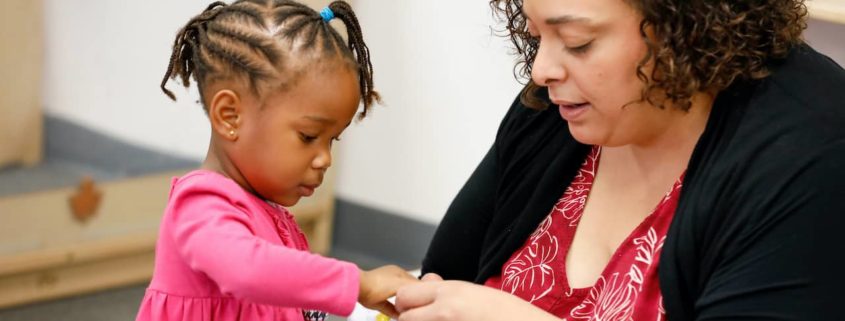When it comes time to start sending your child to school, you may be wondering, “Are preschool and pre-k the same?” Though these types of schools are often used interchangeably, preschool and prekindergarten are actually quite different.
But what are some of the differences and similarities when it comes to preschool vs. prekindergarten? From skill development to program focuses, let’s break down the difference between a preschool and pre-k program.
Preschool
The preschool age range is typically three to five years old. This allows the preschool program to focus on social, emotional, and cognitive development. This is a chance for your child to begin exploring and growing in an environment of peers at a similar cognitive level.
Preschool Education & Curriculum
Preschool helps lay the foundation for success in learning and life. From ages three to five, children are at their most receptive to learning new skills and concepts. By the age of five, 90% of a child’s brain develops.
The preschool curriculum typically includes art, science, math, and preschool writing. An effective preschool learning program offers both short-term and long-term cognitive, social, and emotional benefits for your child. Better preparation, higher performance, and even a lower chance of delinquency may be some of the benefits of a well-designed preschool curriculum.
Cognitive Skill Development
The preschool curriculum is meant to help develop the child’s cognitive skills in preparation for kindergarten. This includes basic math, colors, shapes, and pre-writing skills.
Preschool is also a time for preschoolers to learn about their own talents and how they work with others. This teaches children problem-solving skills, emotional intelligence, and the ability to deal positively with frustration which can lead them towards a successful future in school and life.
Socio-Emotional Development
Preschoolers are also learning how to work with other children on projects and activities while developing their social skills. Through a preschool program, preschoolers will learn more about themselves through self-expression and creativity, including lots of fun art projects.
Physical Abilities
Preschoolers develop fine and gross motor skills, learning to write their letters and numbers. This is a great preschool activity that helps preschoolers build physical strength through play, such as running around the playground or participating in sports like soccer.
Prekindergarten
Prekindergarten is a preschool program for four- and five-year-olds. This is also called transitional kindergarten as it tends to prepare preschoolers transitioning from preschool into the public school system at age five or six.
Pre-k Education & Curriculum
The primary focus of prekindergarten programs is on language, literacy, and math skills development while incorporating other activities preschoolers would do in their programs.
Children attending prekindergarten will learn how to spell, write, and read their names along with basic addition and subtraction of numbers. They are also introduced to science through hands-on activities like catching insects or exploring the elements of nature around them. Social studies is also an important preschool subject, with the focus being on learning numbers, counting, and telling time.
Prekindergarten is also an important transitional stage for preschoolers transitioning from preschool into early elementary school education, where they will learn how to work in a classroom environment.
Cognitive Skill Development
Healthy children are born with 100 trillion brain cells, each generating up to 20,000 connections. Cells that don’t communicate eventually die and are never replaced. Through rich environments, stimulating experiences, and responsive interactions, prekindergarteners are able to develop emergent cognitive skills. Children at this age benefit from creative activities that prepare them for the following stage of learning with a better understanding of logic and language.
Socio-Emotional Development
Social-emotional development is influenced by positive early social interactions, secure connections with parents and guardians, healthy adult behavior, and the norm of participating in society. Opportunities for children to communicate feelings rather than through physical contact or non-verbal means are beneficial to socialization. During prekindergarten, children will learn how to express themselves to others in this communicative way.
Physical Abilities
Four- and five-year-olds are full of life and require games and environments that are active. Activities like building, dancing, painting, and similar tasks help develop gross and fine motor skills, coordination, and attention.
Preschool vs. Prekindergarten: How Are They different?
As we’ve seen in the comparisons above, school readiness, skill development, and ages all highlight key differences between preschool vs. prekindergarten.
In addition, the main difference between preschool vs. prekindergarten is that preschool programs focus on socialization skills along with creative, theme-based activities, while prekindergarten programs focus on learning the basics of writing, reading, and math skills to aid in a transition into elementary school education.
Explore Preschool and Prekindergarten Programs
To learn more about the differences between programs, take a look at Cadence Education’s preschool programs and pre-k programs. At Cadence Education, your child will receive the highest quality of education in a nurturing environment. Our educational programs work with your child to ensure their needs are met every step of the way.

